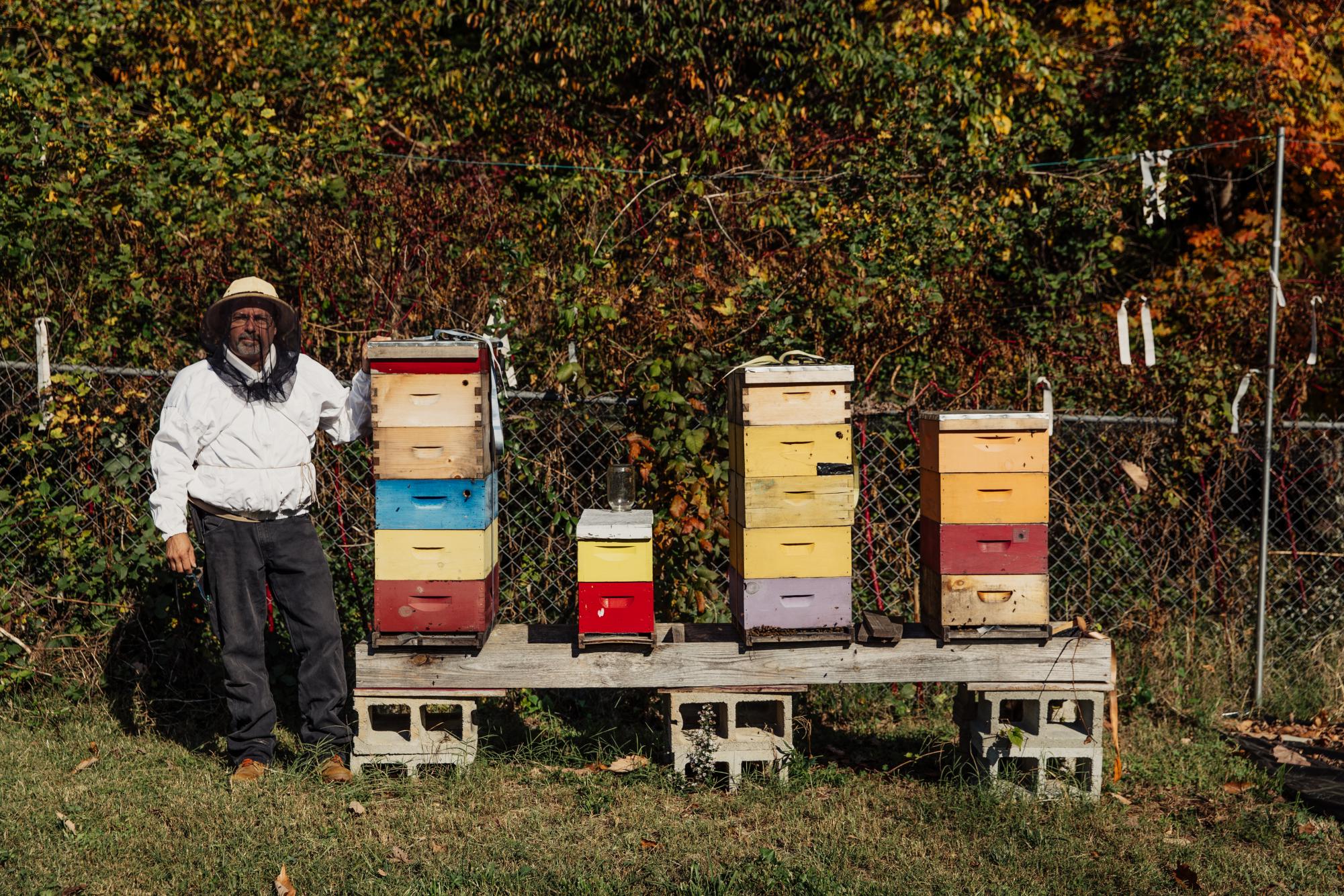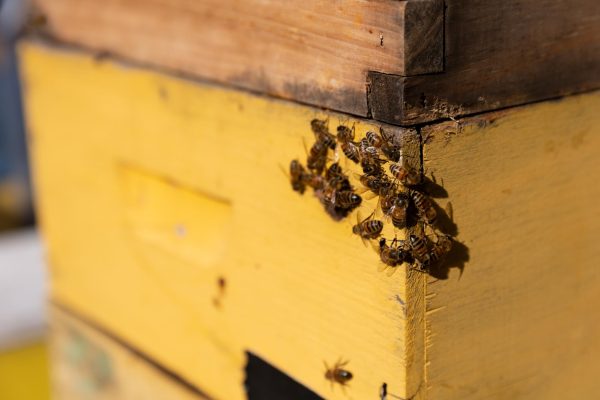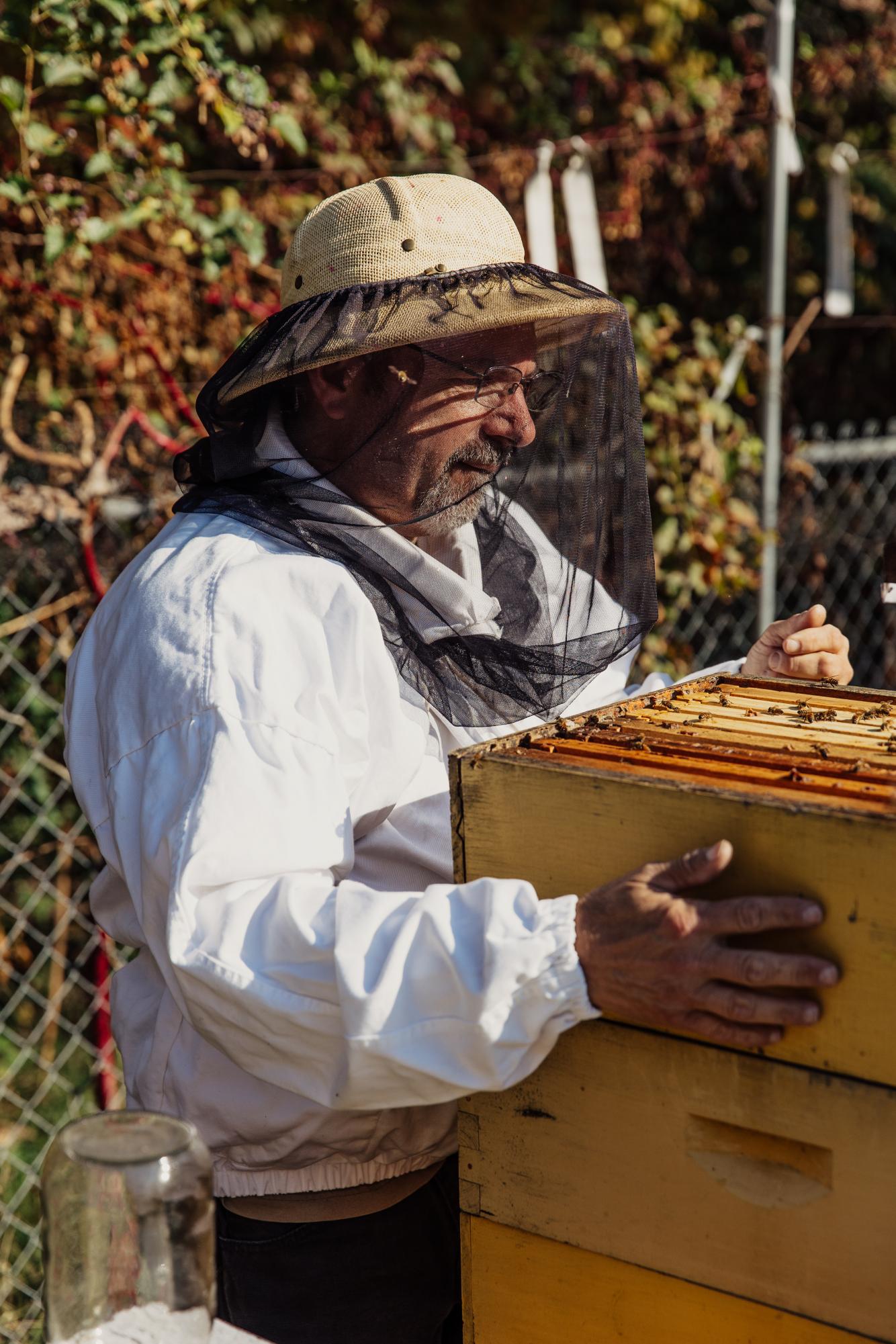The steady hum of bees fills the air as I stand beside David Link in Reynolda Village, a seasoned local beekeeper. Red, yellow and blue boxes are stacked atop one another – each its own hive. At first, I felt nervous, given that the hive of bees was mere inches from my face, but David’s calm demeanor immediately rubbed off on me.
“We’re standing right here behind these hives, and they could care less we’re here,” he reassures me. “They’re just checking you out.”
Link has been beekeeping for about 15 years. He has managed over 100 hives, 65 of which are still thriving. They span the entirety of Winston-Salem, from Reynolda to Campus Gardens to Pilot Mountain. He is also a teacher in the Forsyth County Beekeepers Association, which began in 1973. For Link, beekeeping is much more than just a hobby — it is about working with nature and understanding that, like communities of people, each hive is different.
Link’s beekeeping journey began as a way to save his vegetable garden, which was struggling due to a lack of pollinators. A classmate at Forsyth Tech introduced him to beekeeping, and soon he had two small hives in his backyard. He initially started with Italian honey bees, given that they are more popular and readily available. However, despite seeing his garden flourish that spring, the bees didn’t survive.
He decided to switch to Russian honey bees, having learned that they are the best breed for North Carolina. Originating in the Primorsky Region of Russia, these bees can withstand cold temperatures and even fly through the rain. They are naturally resistant to Varroa and tracheal mites, so Link does not have to use chemicals to keep them healthy. Chemical treatments cut a queen’s life short, making it more difficult to sustain the hive. Link is committed to beekeeping in its most natural form, with minimal intervention. It takes patience to cultivate the right conditions for the hive, and he finds fulfillment in watching them thrive. In the coming spring, he is planning to expand his hive count to 120.

Link is not alone in his beekeeping endeavors, however. He takes on mentees, guiding them through the complexities of hive management. This mentorship is something that he is deeply passionate about — it allows him to share his experience with others and prepare them for managing the hives on their own.
“Beekeeping has shown me that I’m a homebody,” he said, “and beekeeping has shown me a lot that I wouldn’t have seen without it.”
Link treats his hives with care, but at a respectful distance, treating them as though they are wild colonies that he’s providing a home for. His philosophy is simple: give the bees the space and resources they need to thrive, and only intervene when necessary. Working with the bees, hands bare in the hive, is meditative for Link. His bees are very docile, allowing him a rare, profound connection to these hives. By giving them space and respecting their instincts, Link demonstrates that less interference allows the hives to flourish naturally, a lesson in humility and trust in nature’s rhythms.
One way Link ensures his bees are healthy is by leaving enough honey in each hive during the winter. Rather than relying on sugar or corn syrup, he allows the bees to feed on the honey they produce because it is far more beneficial for their health.
For Link, the most rewarding aspect of beekeeping is performing a physical split on his hives, a process where a hive — home to just one queen — is divided into two. While one side of the split keeps the existing queen, the other half must raise a new one.
The satisfaction comes from seeing these hives grow into what Link lovingly refers to as “monster hives.” These massive colonies can get taller than him, with colorful boxes stacked atop one another. This process is not just about productivity, but preventing swarming, the process through which congested bee colonies separate in the wild. If the bees swarm, half of the hive could fly away and be lost. By managing the instinct to swarm, Link can maintain a healthy, thriving colony.

Link’s genuine love for beekeeping shines through the way he talks about his bees. He is so at ease as he describes this process, but also equally excited to share it with me. His voice lifts with excitement as he describes these intricacies of hive management, and it is clear that nothing brings him more joy.
Link stresses the need for bees that can care for themselves. Breeds like Russian and Carniolan bees offer hope, given that they are self-sustaining. For Link, it’s not just about honey production, but the joy of seeing hives thrive — knowing they are contributing to something larger.
As more land is cleared for housing and farming, there is a decline in native bee populations. Managed honeybees have become crucial to sustaining our food supply, as native pollinators have become too few to handle the task.
Link urges people to be careful with pesticide use because many don’t realize that pesticides harm the delicate ecosystem inside a hive, especially the fungi. Honeybees do not have their own immune system. Instead, they rely on fungi within the hive to create a layer of protection that keeps them healthy. Without these fungi, bees become more vulnerable, so it is important to pay attention to what we spray and where.
Link uses hives as a valuable educational tool. Students and volunteers regularly visit the hives, learning about the role that honeybees play in our environment. Once, he demonstrated honey extraction to a junior high class and let the students manually crank the extractor and bottle the honey. According to Link, the more people know about the importance of bees, the better we can protect them.







